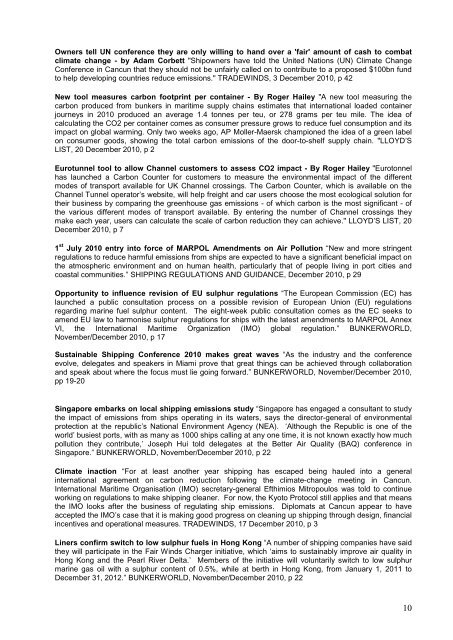CURRENT AWARENESS BULLETIN - IMO
CURRENT AWARENESS BULLETIN - IMO
CURRENT AWARENESS BULLETIN - IMO
Create successful ePaper yourself
Turn your PDF publications into a flip-book with our unique Google optimized e-Paper software.
Owners tell UN conference they are only willing to hand over a 'fair' amount of cash to combat<br />
climate change - by Adam Corbett "Shipowners have told the United Nations (UN) Climate Change<br />
Conference in Cancun that they should not be unfairly called on to contribute to a proposed $100bn fund<br />
to help developing countries reduce emissions." TRADEWINDS, 3 December 2010, p 42<br />
New tool measures carbon footprint per container - By Roger Hailey "A new tool measuring the<br />
carbon produced from bunkers in maritime supply chains estimates that international loaded container<br />
journeys in 2010 produced an average 1.4 tonnes per teu, or 278 grams per teu mile. The idea of<br />
calculating the CO2 per container comes as consumer pressure grows to reduce fuel consumption and its<br />
impact on global warming. Only two weeks ago, AP Moller-Maersk championed the idea of a green label<br />
on consumer goods, showing the total carbon emissions of the door-to-shelf supply chain. "LLOYD’S<br />
LIST, 20 December 2010, p 2<br />
Eurotunnel tool to allow Channel customers to assess CO2 impact - By Roger Hailey "Eurotonnel<br />
has launched a Carbon Counter for customers to measure the environmental impact of the different<br />
modes of transport available for UK Channel crossings. The Carbon Counter, which is available on the<br />
Channel Tunnel operator’s website, will help freight and car users choose the most ecological solution for<br />
their business by comparing the greenhouse gas emissions - of which carbon is the most significant - of<br />
the various different modes of transport available. By entering the number of Channel crossings they<br />
make each year, users can calculate the scale of carbon reduction they can achieve." LLOYD’S LIST, 20<br />
December 2010, p 7<br />
1 st July 2010 entry into force of MARPOL Amendments on Air Pollution “New and more stringent<br />
regulations to reduce harmful emissions from ships are expected to have a significant beneficial impact on<br />
the atmospheric environment and on human health, particularly that of people living in port cities and<br />
coastal communities.” SHIPPING REGULATIONS AND GUIDANCE, December 2010, p 29<br />
Opportunity to influence revision of EU sulphur regulations “The European Commission (EC) has<br />
launched a public consultation process on a possible revision of European Union (EU) regulations<br />
regarding marine fuel sulphur content. The eight-week public consultation comes as the EC seeks to<br />
amend EU law to harmonise sulphur regulations for ships with the latest amendments to MARPOL Annex<br />
VI, the International Maritime Organization (<strong>IMO</strong>) global regulation.” BUNKERWORLD,<br />
November/December 2010, p 17<br />
Sustainable Shipping Conference 2010 makes great waves “As the industry and the conference<br />
evolve, delegates and speakers in Miami prove that great things can be achieved through collaboration<br />
and speak about where the focus must lie going forward.” BUNKERWORLD, November/December 2010,<br />
pp 19-20<br />
Singapore embarks on local shipping emissions study “Singapore has engaged a consultant to study<br />
the impact of emissions from ships operating in its waters, says the director-general of environmental<br />
protection at the republic’s National Environment Agency (NEA). ‘Although the Republic is one of the<br />
world’ busiest ports, with as many as 1000 ships calling at any one time, it is not known exactly how much<br />
pollution they contribute,’ Joseph Hui told delegates at the Better Air Quality (BAQ) conference in<br />
Singapore.” BUNKERWORLD, November/December 2010, p 22<br />
Climate inaction “For at least another year shipping has escaped being hauled into a general<br />
international agreement on carbon reduction following the climate-change meeting in Cancun.<br />
International Maritime Organisation (<strong>IMO</strong>) secretary-general Efthimios Mitropoulos was told to continue<br />
working on regulations to make shipping cleaner. For now, the Kyoto Protocol still applies and that means<br />
the <strong>IMO</strong> looks after the business of regulating ship emissions. Diplomats at Cancun appear to have<br />
accepted the <strong>IMO</strong>’s case that it is making good progress on cleaning up shipping through design, financial<br />
incentives and operational measures. TRADEWINDS, 17 December 2010, p 3<br />
Liners confirm switch to low sulphur fuels in Hong Kong “A number of shipping companies have said<br />
they will participate in the Fair Winds Charger initiative, which ‘aims to sustainably improve air quality in<br />
Hong Kong and the Pearl River Delta.’ Members of the initiative will voluntarily switch to low sulphur<br />
marine gas oil with a sulphur content of 0.5%, while at berth in Hong Kong, from January 1, 2011 to<br />
December 31, 2012.” BUNKERWORLD, November/December 2010, p 22<br />
10
















